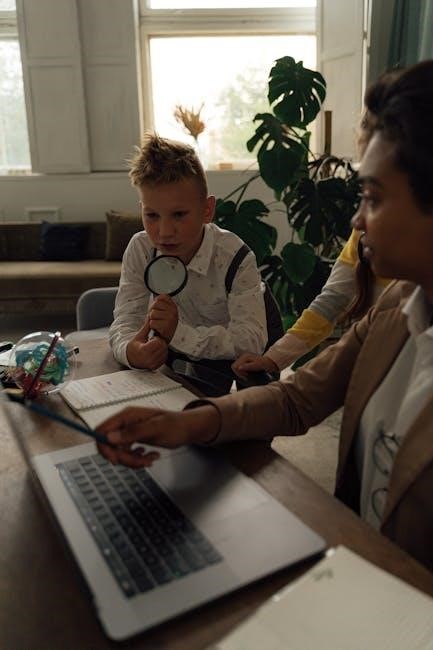Action research is a systematic investigation by educators to improve teaching practices and address classroom challenges. It emphasizes collaboration, reflection, and professional development to enhance student learning.
1.1 What is Action Research?
Action research is a systematic, collaborative, and cyclical process where educators investigate and improve their own teaching practices. It involves identifying issues, planning actions, implementing changes, and reflecting on outcomes to enhance student learning and professional growth. This approach empowers teachers to become active researchers, fostering a culture of continuous improvement and evidence-based decision-making in educational settings.
1.2 Importance of Action Research in Education
Action research plays a pivotal role in education by empowering teachers to address classroom challenges and improve student outcomes. It fosters professional development, enhances problem-solving skills, and promotes collaboration among educators. By enabling teachers to become active researchers, it leads to evidence-based practices, improved teaching strategies, and a more engaged learning environment, ultimately benefiting both students and the educational community.

Key Concepts in Action Research
Action research involves systematic investigation by educators to improve practices, emphasizing collaboration, reflection, and problem-solving. It empowers teachers to address challenges and enhance educational outcomes effectively.
2.1 Action Research in Theory
Action research in theory involves systematic, solution-oriented investigation to improve educational practices. It engages educators, students, and stakeholders in collaborative, reflective processes to address challenges and enhance learning. This iterative approach emphasizes problem-solving, professional growth, and societal benefit, fostering a dynamic relationship between theory and practice in educational settings.
2.2 Purpose and Participants in Action Research
Action research aims to improve educational practices and solve real-world problems through systematic investigation. Participants include teachers, students, and stakeholders, who collaborate to identify issues, collect data, and implement solutions. This collaborative approach empowers educators, fostering a culture of reflection, innovation, and continuous improvement in teaching and learning environments.
The Action Research Process
The action research process involves identifying issues, planning interventions, implementing changes, and reflecting on outcomes. It is a cyclical, collaborative approach to improving educational practices.
3.1 Steps to Conduct Action Research
The process begins with identifying a focus area, followed by a literature review to inform the research. Data collection techniques are then applied, ensuring validity and reliability. Analysis and interpretation of findings lead to action planning. Implementation of strategies occurs, with ongoing monitoring and evaluation of outcomes. This cyclical process fosters collaboration and reflection, driving educational improvements.
3.2 Review of Related Literature
A review of related literature is crucial for understanding existing knowledge on the research topic. It involves analyzing studies, theories, and practices relevant to the focus area. This step helps identify gaps, inform research design, and ensure a well-grounded investigation. Systematic searches in academic databases and credible sources are essential to gather comprehensive insights, guiding the research process effectively.
Data Collection in Action Research
Data collection involves systematic gathering of information through techniques like observations, interviews, and surveys. It ensures validity, reliability, and ethical considerations, providing accurate insights.
4.1 Data Collection Techniques
Action research employs various data collection techniques, including observations, interviews, surveys, and document analysis. These methods help gather qualitative and quantitative data, providing insights into classroom dynamics and student interactions. Observations allow real-time monitoring, while interviews offer in-depth perspectives. Surveys quantify trends, and document analysis reviews existing materials. Each technique is chosen based on research goals, ensuring comprehensive and meaningful data collection.
4.2 Considerations: Validity, Reliability, and Generalizability
In action research, ensuring validity involves verifying that data accurately reflects the research focus. Reliability requires consistent data collection methods to yield repeatable results. Generalizability assesses whether findings apply beyond the specific context. Techniques like triangulation, consistent procedures, and transparent documentation enhance credibility. Ethical considerations, such as informed consent and confidentiality, are also crucial to maintain trust and rigor in the research process.

Data Analysis and Interpretation
This phase involves systematically analyzing data to identify patterns, themes, and relationships. It emphasizes interpreting results to inform decision-making and improve educational practices effectively.
5.1 Methods for Analyzing Data
Action research employs both qualitative and quantitative methods for data analysis. Techniques include coding, thematic analysis, and statistical tools to identify patterns. Collaborative approaches involve teachers and students in interpreting data, ensuring practical relevance. This step ensures findings are actionable, fostering educational improvements and informed decision-making.
5.2 Interpreting Results for Educational Change
Interpreting results in action research involves translating data into actionable insights to drive educational improvements. This step focuses on identifying patterns, drawing meaningful conclusions, and linking findings to teaching practices. By collaborating with stakeholders, teachers can develop practical strategies to address challenges, enhance student engagement, and foster positive learning outcomes. This collaborative approach ensures sustainable and impactful educational change.
Action Planning and Implementation
Action planning involves developing strategies based on research findings, while implementation ensures these strategies are successfully applied and monitored to achieve desired educational outcomes.
6.1 Developing Strategies for Educational Change
Developing strategies for educational change involves creating actionable plans based on research findings; Teachers collaborate with stakeholders to design interventions that address identified issues, align with learning goals, and foster improvement. These strategies are tailored to specific classroom needs, ensuring they are practical and sustainable. Regular feedback and iteration refine their effectiveness, promoting meaningful and lasting educational change.
6.2 Monitoring and Evaluating Action
Monitoring and evaluating action involves systematically tracking the effectiveness of implemented strategies. Teachers collect feedback from students and peers, assess progress toward goals, and reflect on outcomes. Data is analyzed to determine the impact of changes and identify areas for refinement. This iterative process ensures actions remain aligned with educational objectives and drive continuous improvement in teaching and learning environments.

Writing Up Action Research
Writing up action research involves systematic documentation and clear presentation of findings. It ensures sharing of insights with the educational community for broader impact.
7.1 Reporting Findings Effectively
Reporting findings effectively involves clear, concise, and structured presentation of data, analysis, and conclusions. Use visuals like charts and tables to enhance understanding. Highlight practical implications and recommendations for educational improvement, ensuring the results are accessible and actionable for stakeholders. This step bridges research and practice, fostering collaboration and meaningful change in educational settings.
7.2 Sharing Research with the Educational Community
Sharing research with the educational community fosters collaboration and professional growth. Teachers can present findings through workshops, publications, or online platforms, ensuring accessibility. This dissemination encourages peer dialogue, promotes innovative practices, and empowers educators to adopt evidence-based strategies. Sharing research bridges individual inquiry with collective improvement, benefiting both teaching practices and student learning outcomes.

Evaluating Action Research
Evaluating action research involves assessing its effectiveness in addressing educational challenges and improving practices. It ensures that the research achieves its intended goals and fosters meaningful change.
8.1 Assessing the Effectiveness of Action Research
Assessing the effectiveness of action research involves evaluating its impact on teaching practices, student learning, and professional development. It measures whether the research led to meaningful changes and practical improvements. Effectiveness is determined by the extent to which the implemented strategies address the identified problems and enhance educational outcomes, ensuring the research’s value and relevance in the classroom setting.
8.2 Impact on Teaching Practices and Student Learning
Action research significantly impacts teaching practices by fostering innovation and improving student learning outcomes. It empowers teachers to become reflective practitioners, leading to more effective instructional strategies. This collaborative approach enhances classroom environments, promoting student engagement and academic success. Ultimately, it bridges the gap between theory and practice, benefiting both educators and learners.

Professional Development Through Action Research
Action research enhances professional development by enabling teachers to reflect on practices, identify improvements, and implement effective strategies, fostering growth and innovation in education.
9.1 Enhancing Teaching Practices
Action research empowers teachers to examine and refine their instructional methods, fostering a culture of continuous improvement. By systematically investigating classroom challenges, educators can develop targeted strategies to enhance student engagement and learning outcomes. This reflective process encourages collaboration, innovation, and adaptability, leading to more effective and dynamic teaching practices that address diverse student needs and promote academic success.
9.2 Empowering Teachers as Researchers
Action research transforms teachers into active investigators, enabling them to critically examine their practices and innovate. By engaging in systematic inquiry, educators gain the skills and confidence to identify solutions, share knowledge, and contribute to educational advancements. This empowerment fosters a mindset of continuous learning, collaboration, and leadership, positioning teachers as key agents of change in their professional environments and beyond.

Collaboration and Empowerment in Action Research
Action research fosters collaboration among teachers, students, and stakeholders to address educational challenges collectively. It empowers educators by promoting shared decision-making, reflective practice, and professional growth.
10.1 Role of Teachers and Students
In action research, teachers act as leaders and facilitators, guiding investigations to improve educational practices. Students participate actively, sharing insights and engaging in collaborative problem-solving. This mutual involvement fosters a culture of inquiry, empowering both teachers and students to contribute meaningfully to educational change and improvement.
10.2 Building a Collaborative Environment
Building a collaborative environment in action research involves fostering mutual respect, open communication, and shared goals among participants. Trust and dialogue are essential, enabling teachers and students to work together effectively. This collective approach promotes problem-solving, innovation, and empowerment, leading to meaningful educational change and a stronger sense of community within the learning setting.
Challenges in Action Research
Action research often faces challenges such as time constraints, limited resources, and participant resistance, requiring creative strategies to overcome these obstacles effectively.
11.1 Common Obstacles in Conducting Action Research
Action research often encounters challenges such as time constraints, limited resources, and resistance from participants. Additionally, balancing research with teaching duties and ensuring ethical standards can pose difficulties. Addressing these obstacles requires strategic planning, stakeholder engagement, and sometimes external support to maintain the integrity and effectiveness of the research process.
11.2 Strategies for Overcoming Challenges
Effective strategies include fostering collaboration among stakeholders, allocating dedicated time for research, and accessing professional development resources. Building support systems, ensuring clear communication, and maintaining flexibility can also address obstacles. Prioritizing ethical considerations and continuously reflecting on the research process helps in adapting strategies to overcome challenges effectively.

The Future of Action Research in Education
Action research will likely evolve with emerging trends, emphasizing innovative approaches and technology integration. It will continue to empower educators, fostering collaborative learning and professional growth.
12.1 Emerging Trends in Action Research
Emerging trends in action research include increased integration of technology, data-driven practices, and global collaboration. Educators are leveraging digital tools for data collection and analysis, while fostering equitable education through inclusive research practices. These trends emphasize innovative approaches to professional development, enhancing the role of teachers as researchers and promoting systemic educational improvement.
12.2 Innovations in Teacher Researcher Practices
Innovations in teacher researcher practices include the use of technology tools, collaborative learning platforms, and data-driven decision-making. Teachers are increasingly engaging in co-research with students, fostering empowerment and inclusive education. These practices emphasize culturally responsive research, data literacy, and ethical considerations, enabling educators to address diverse student needs and create impactful, student-centered learning environments.

